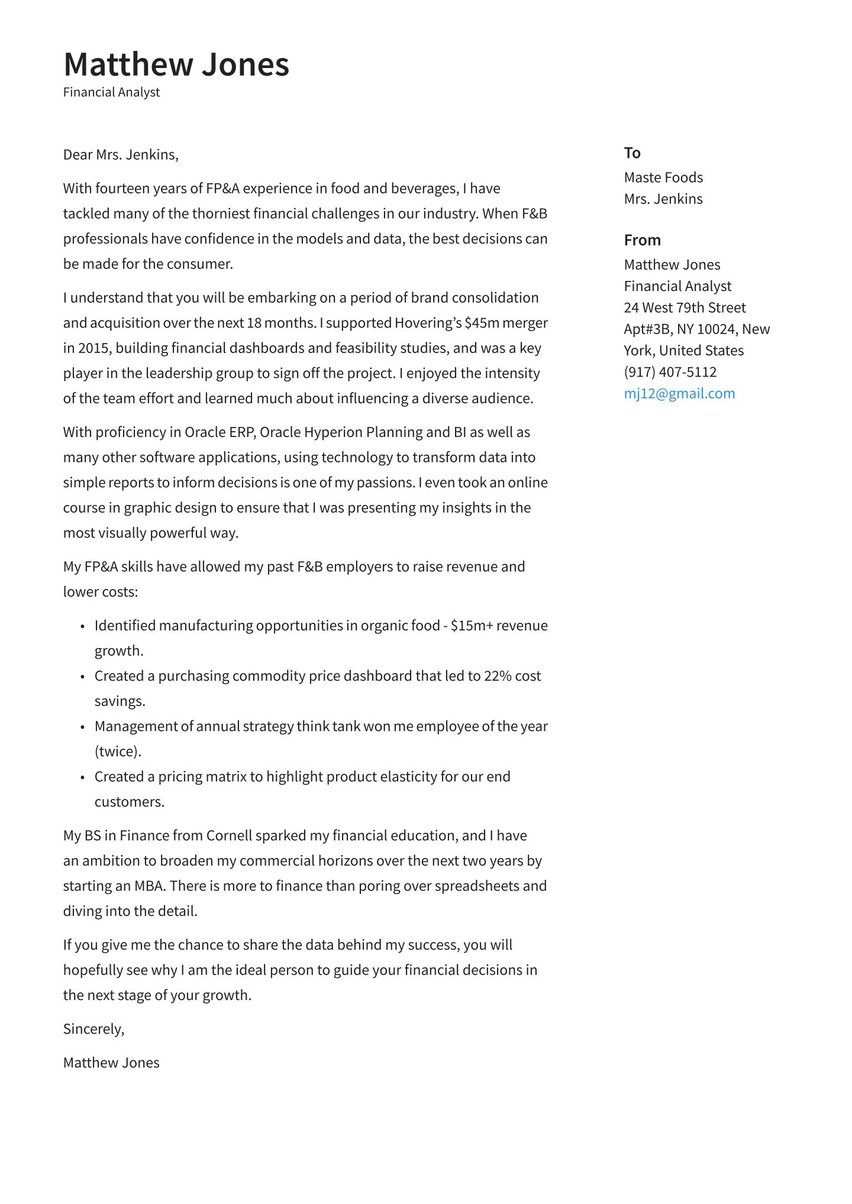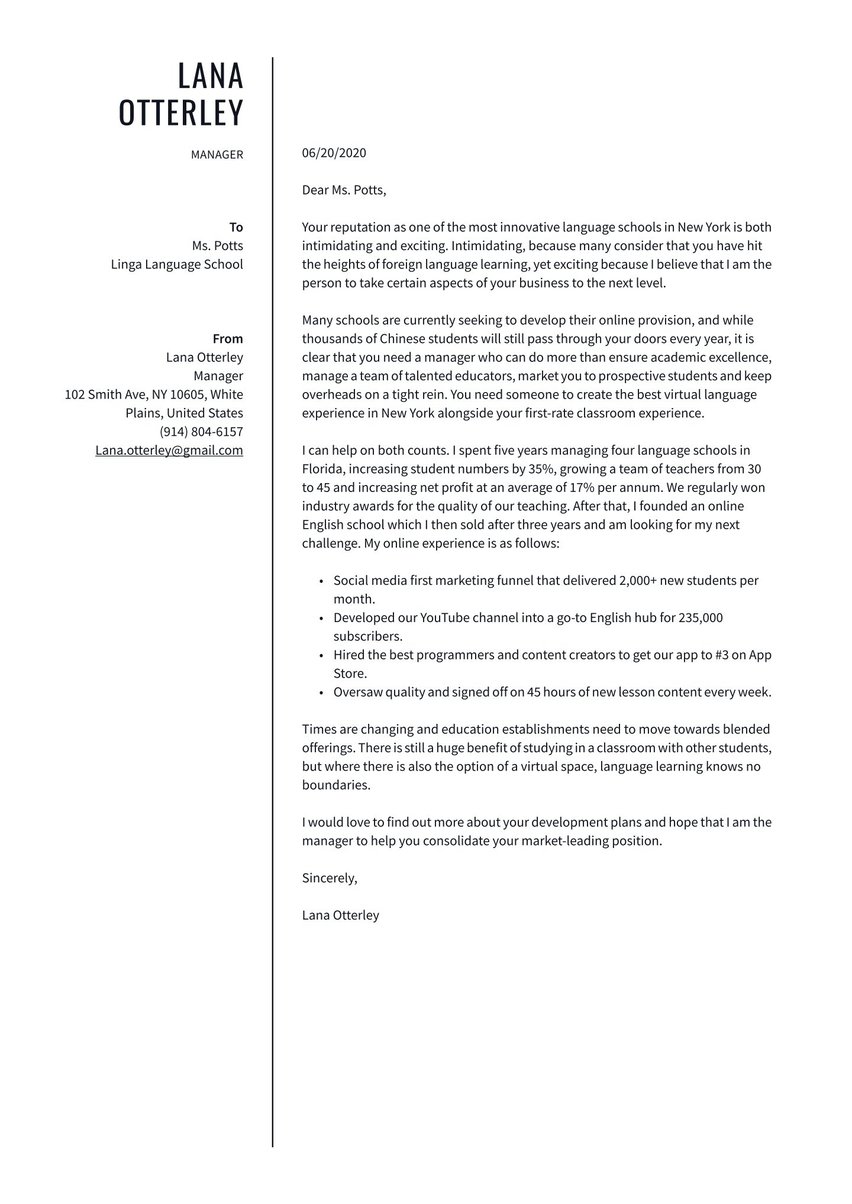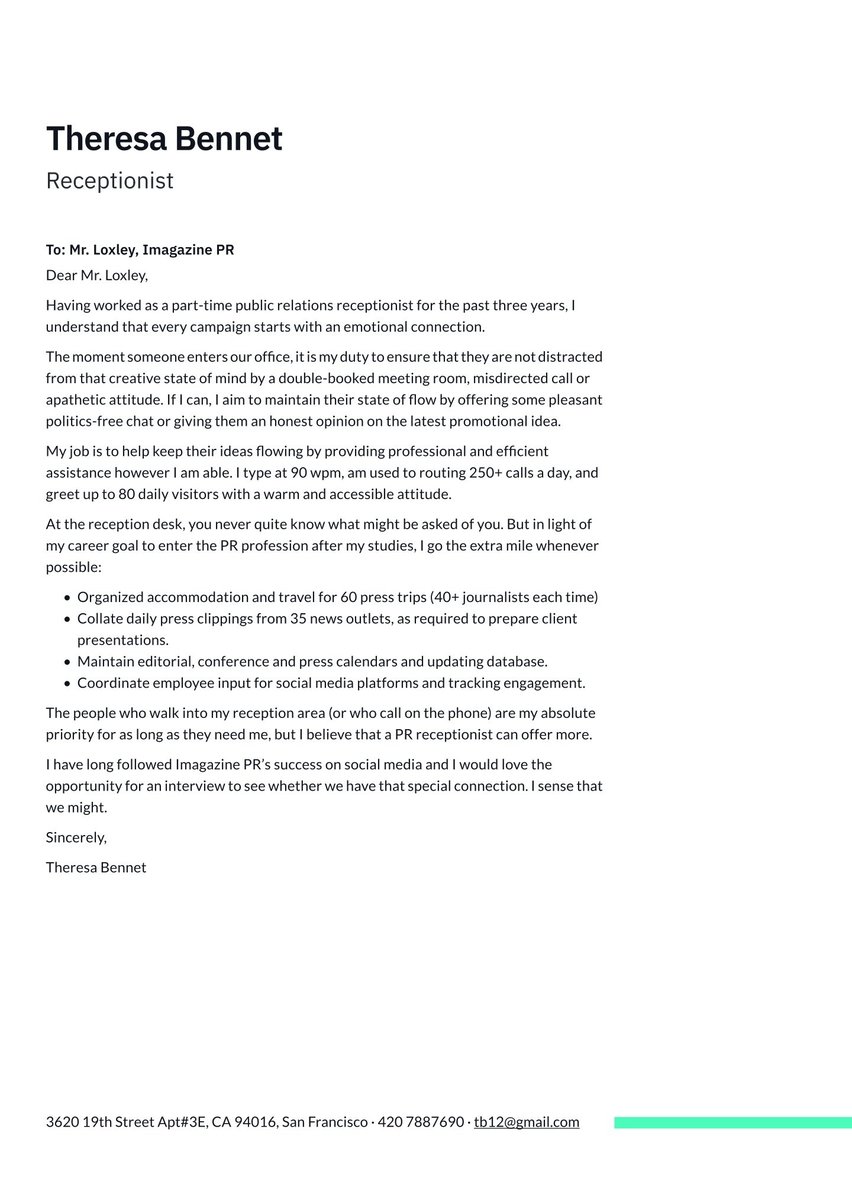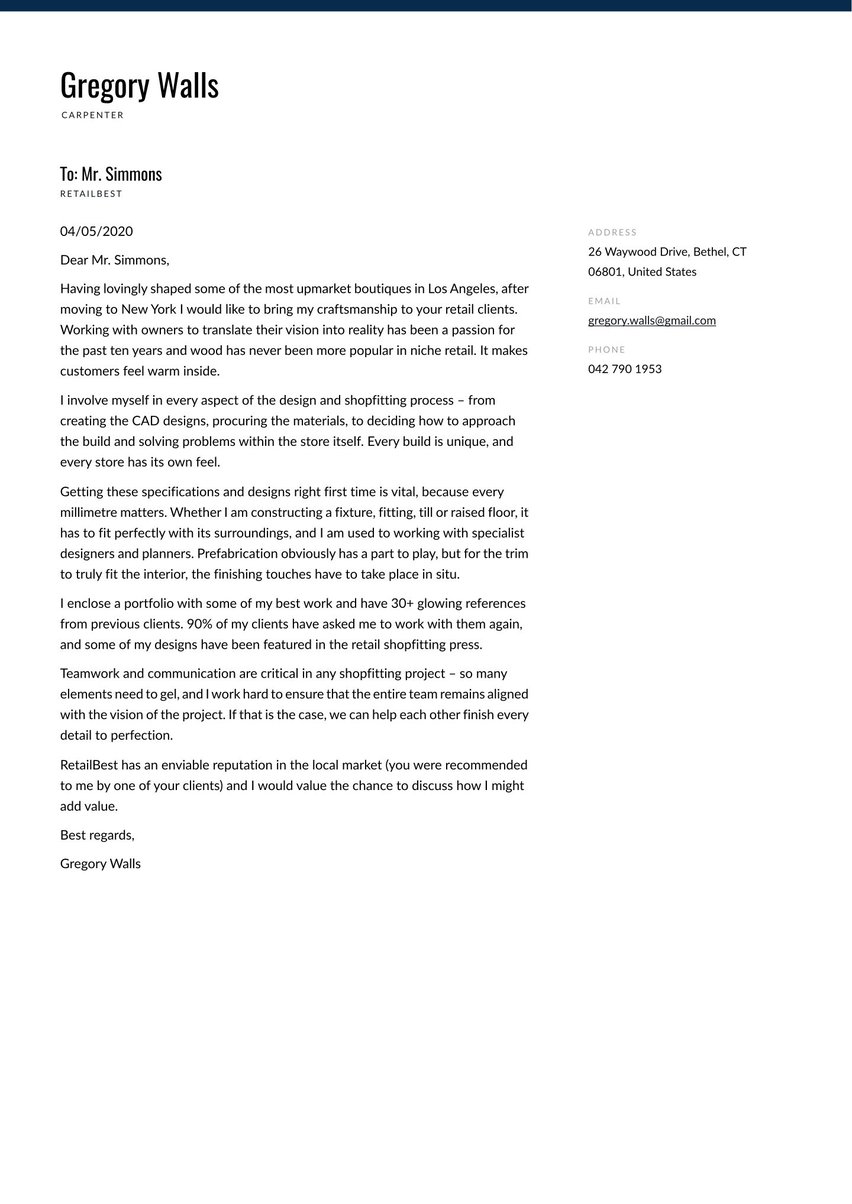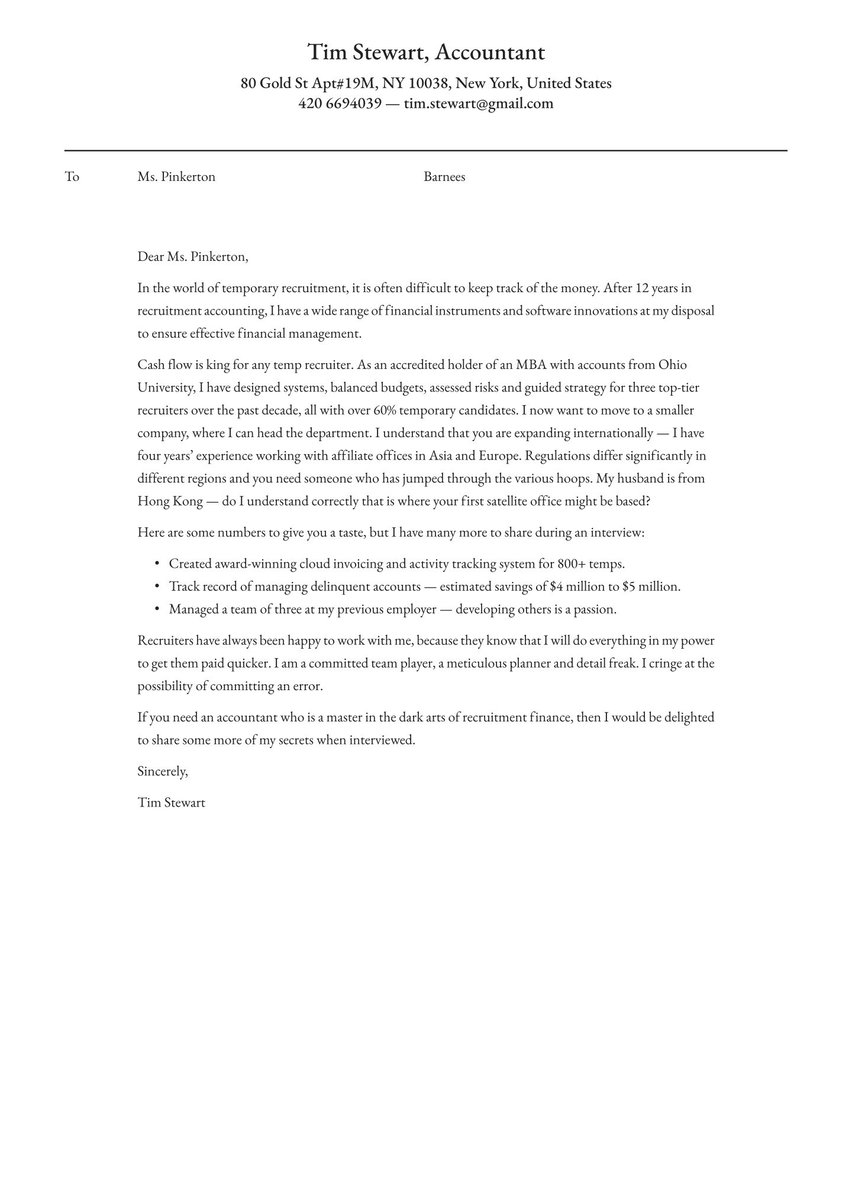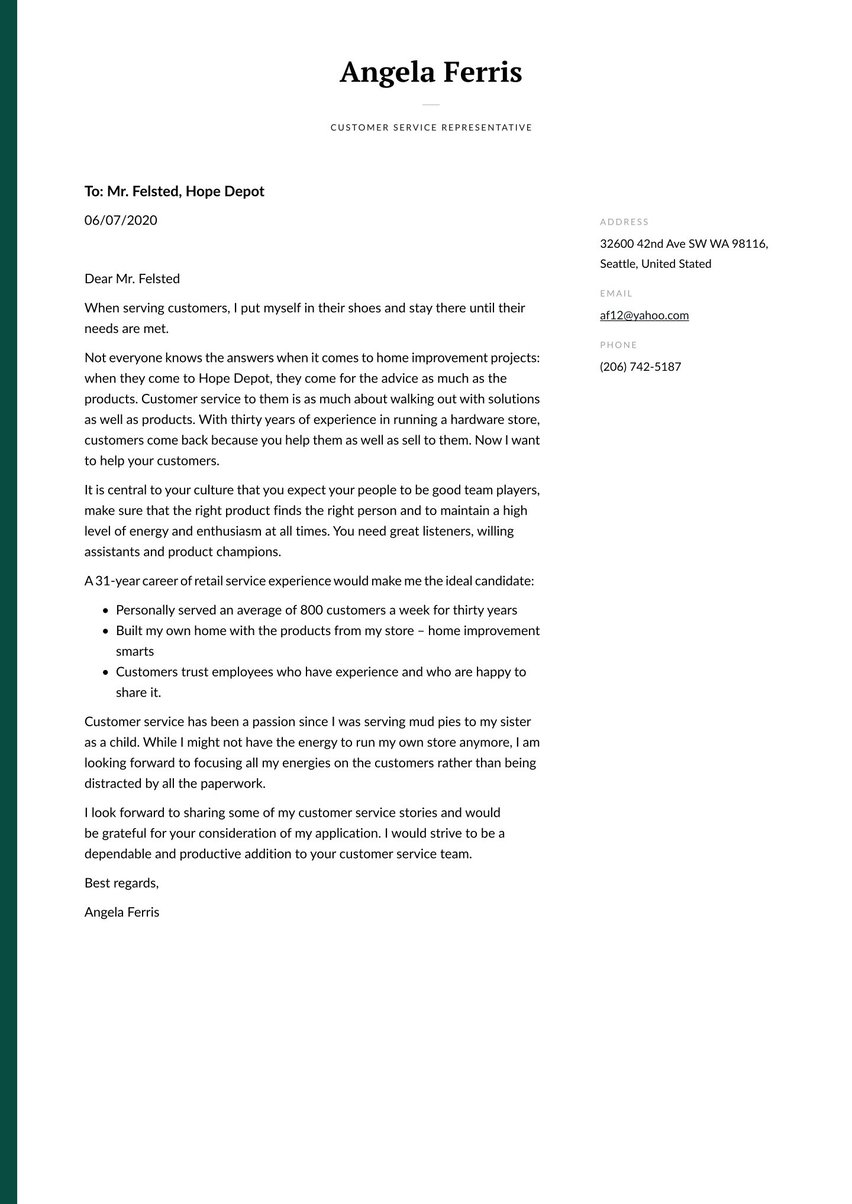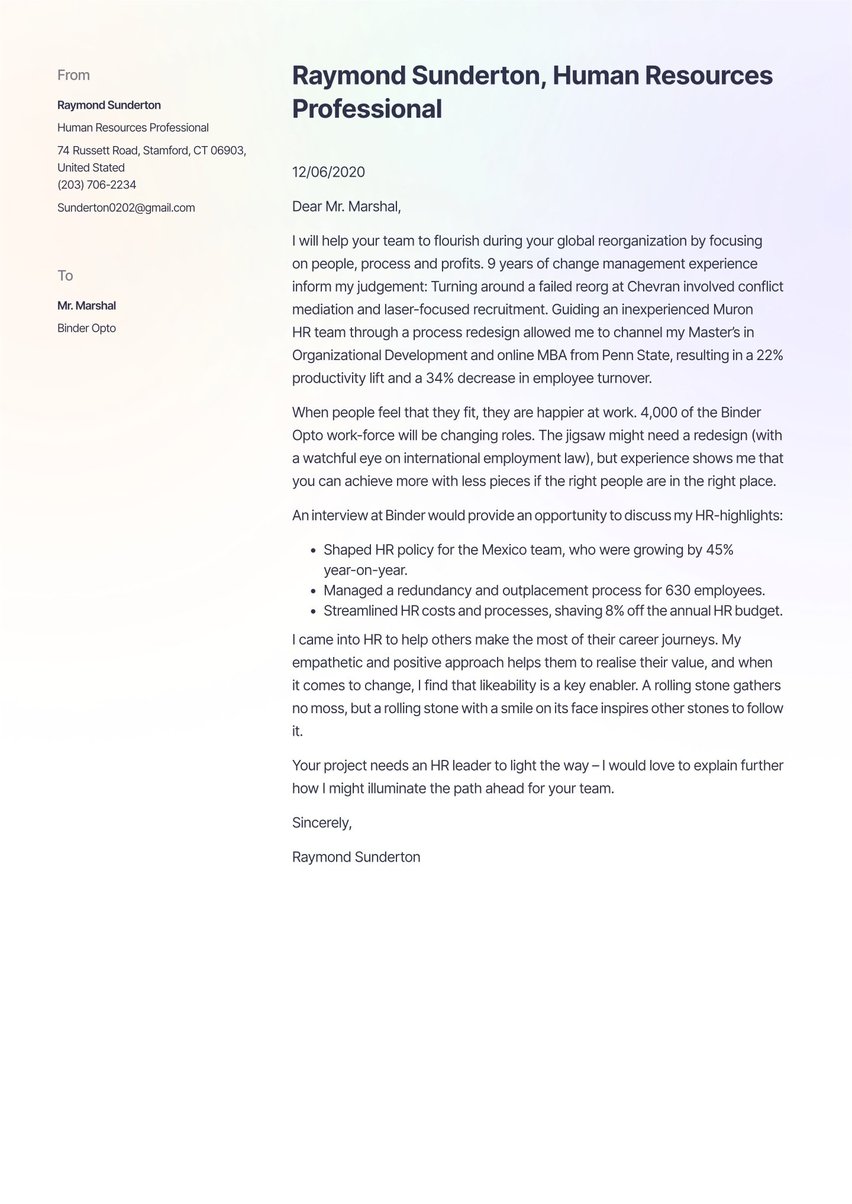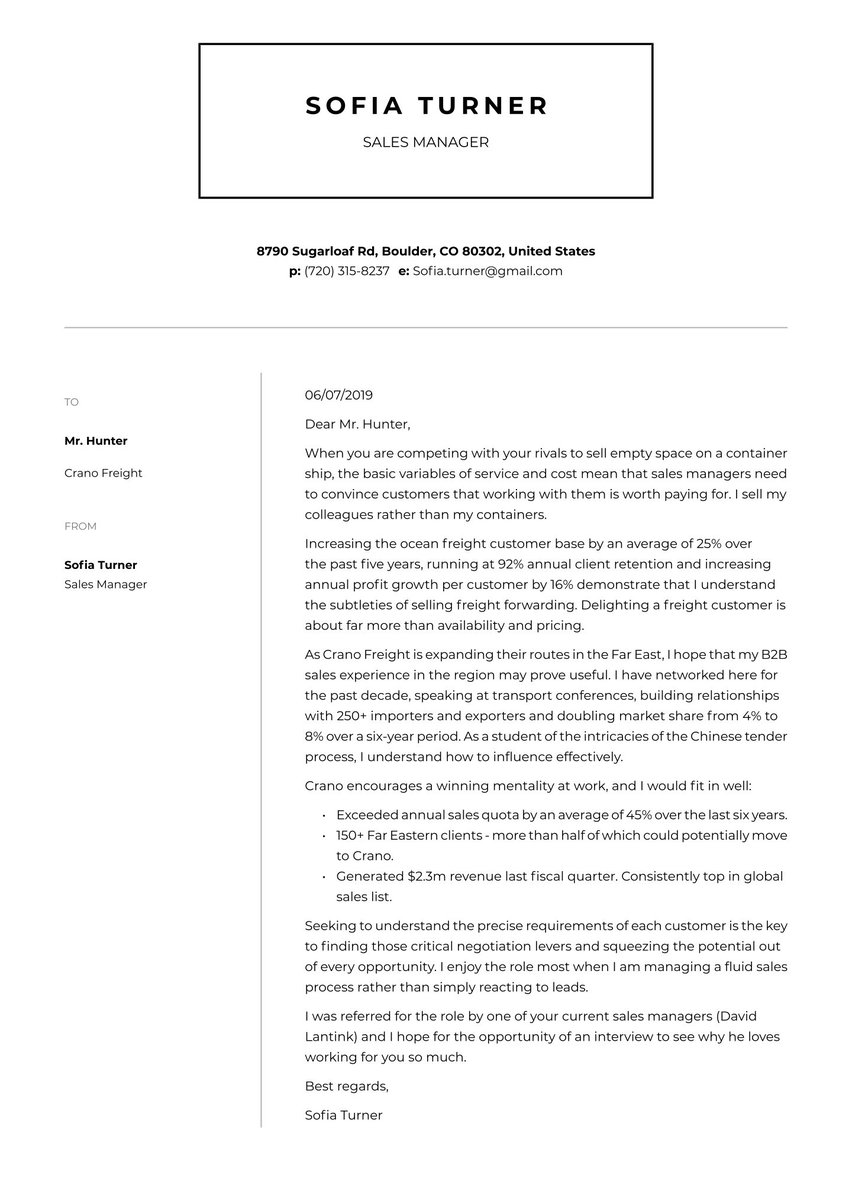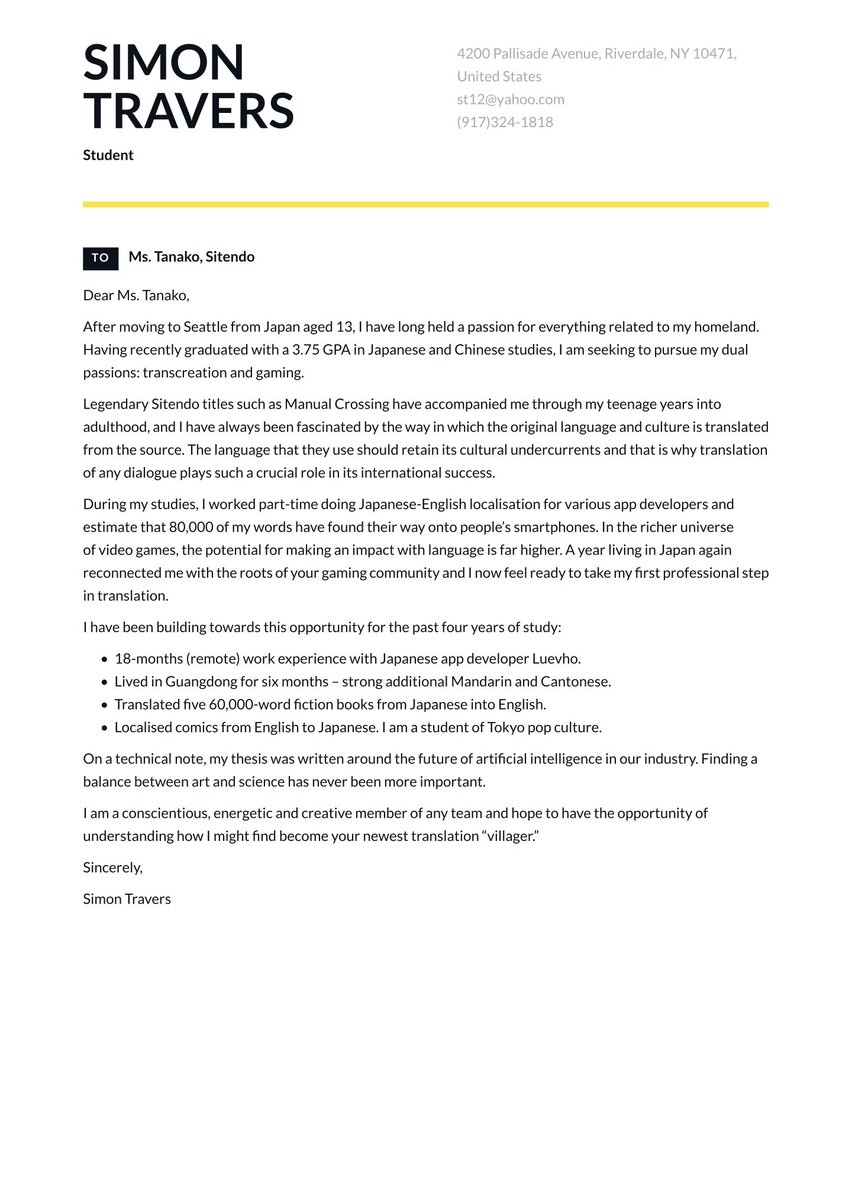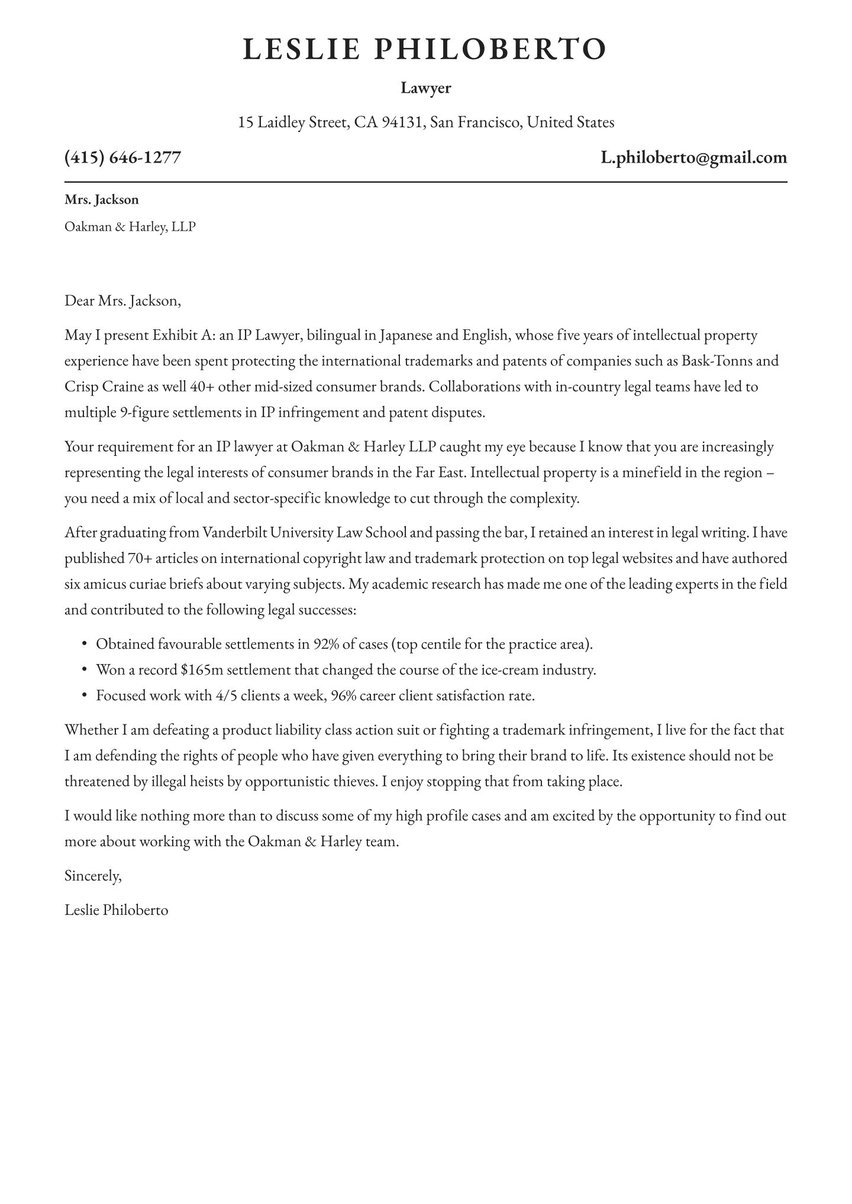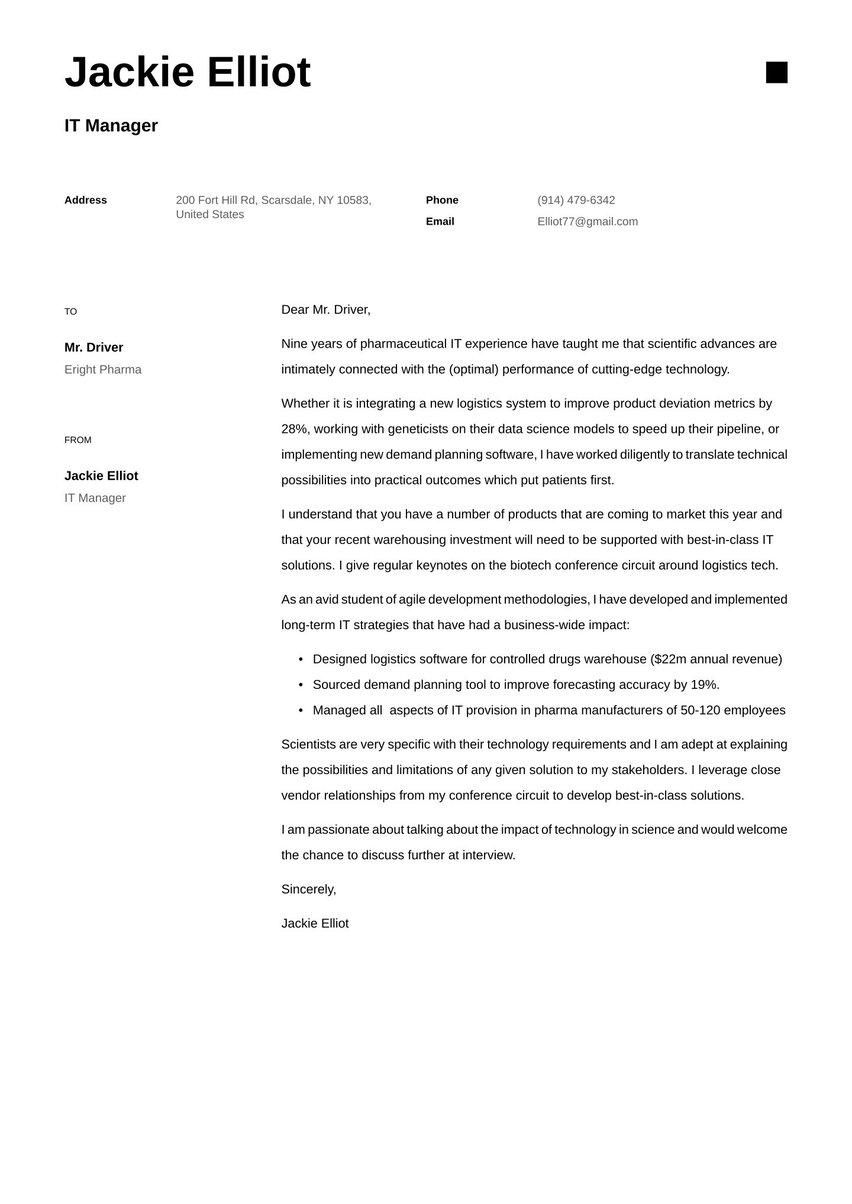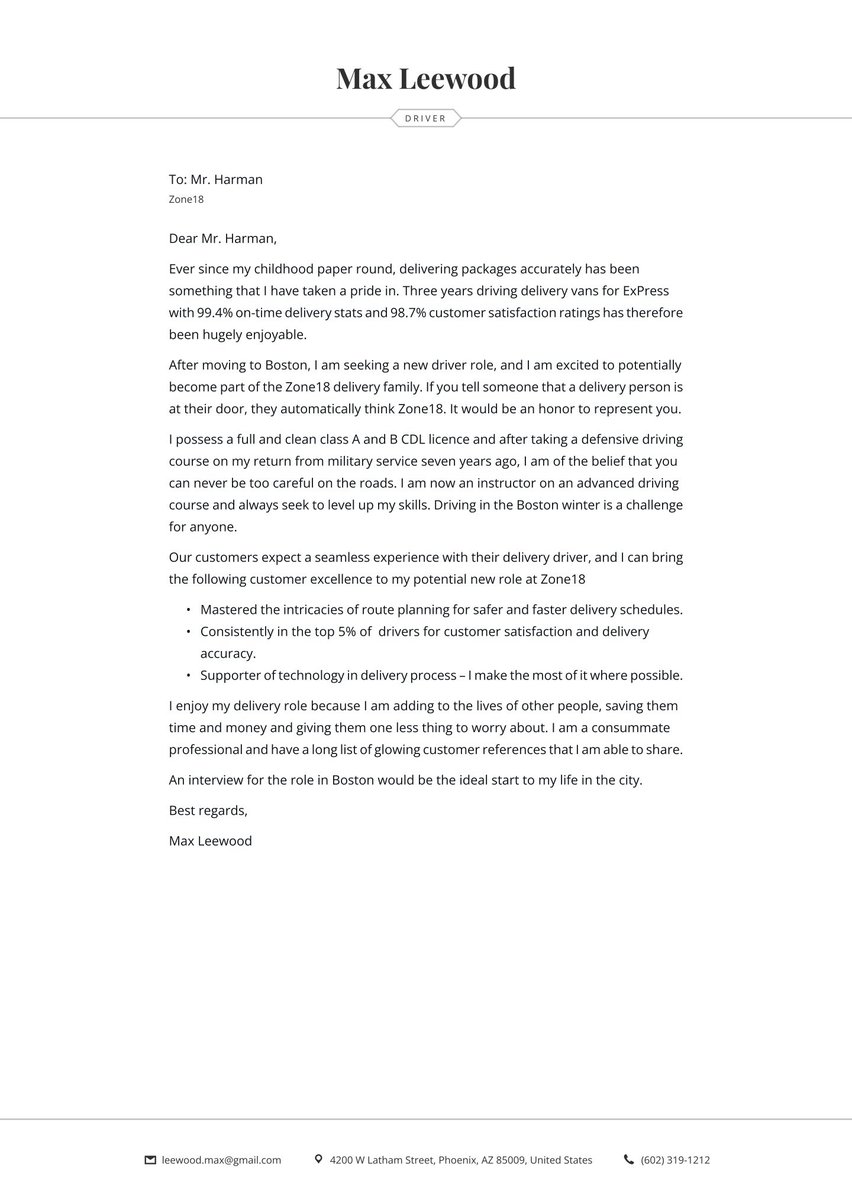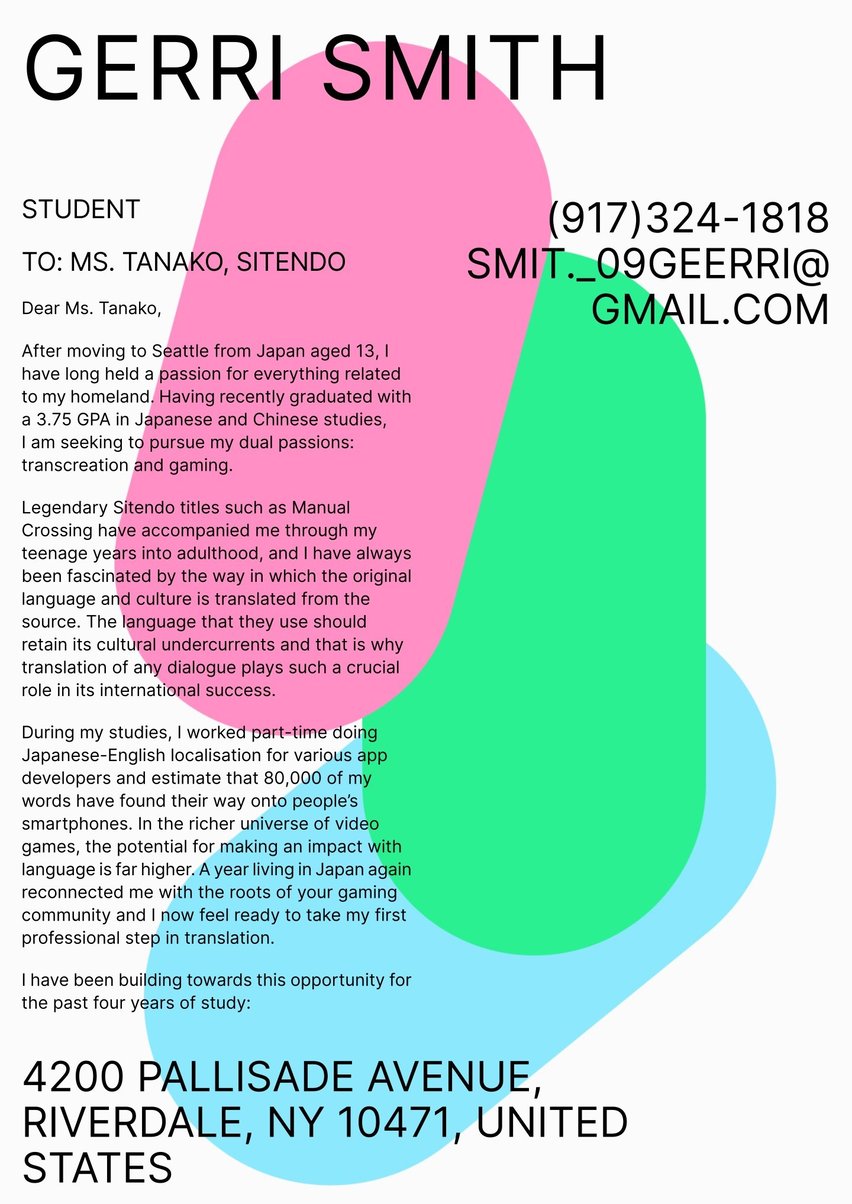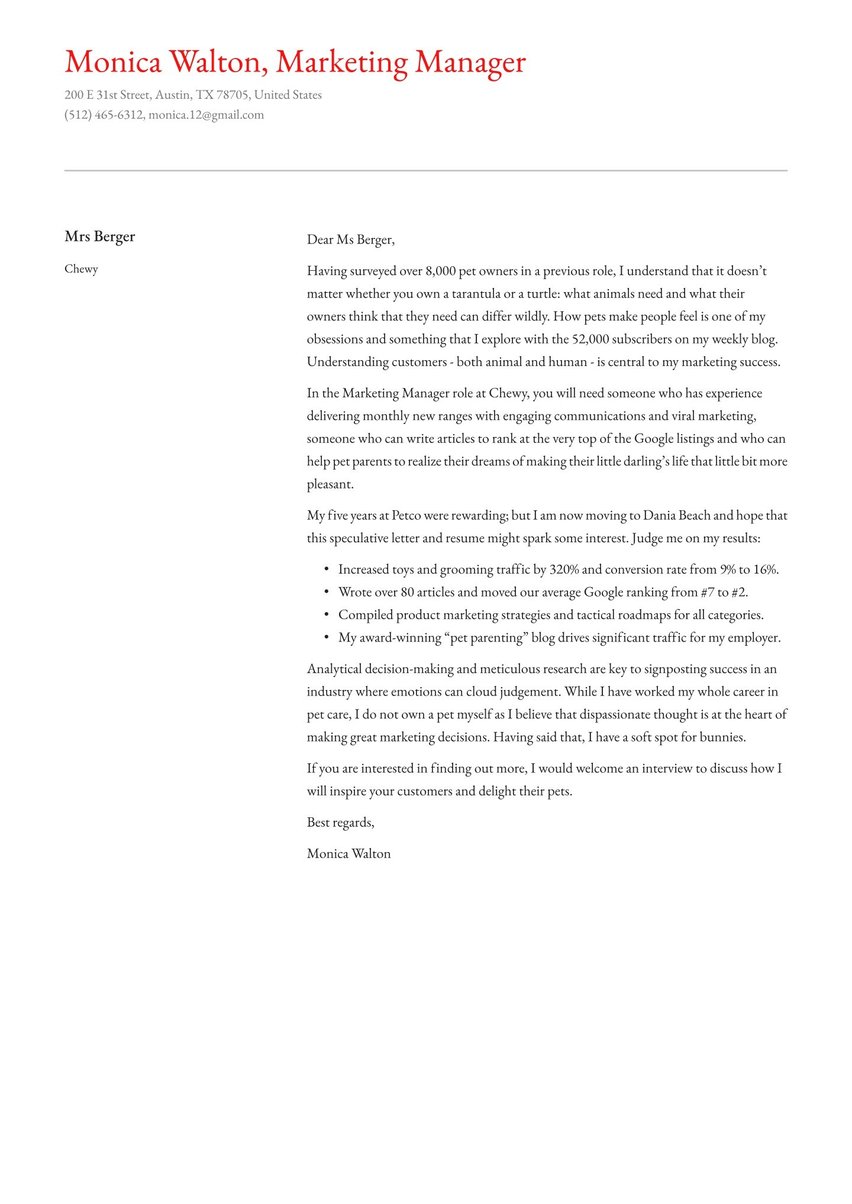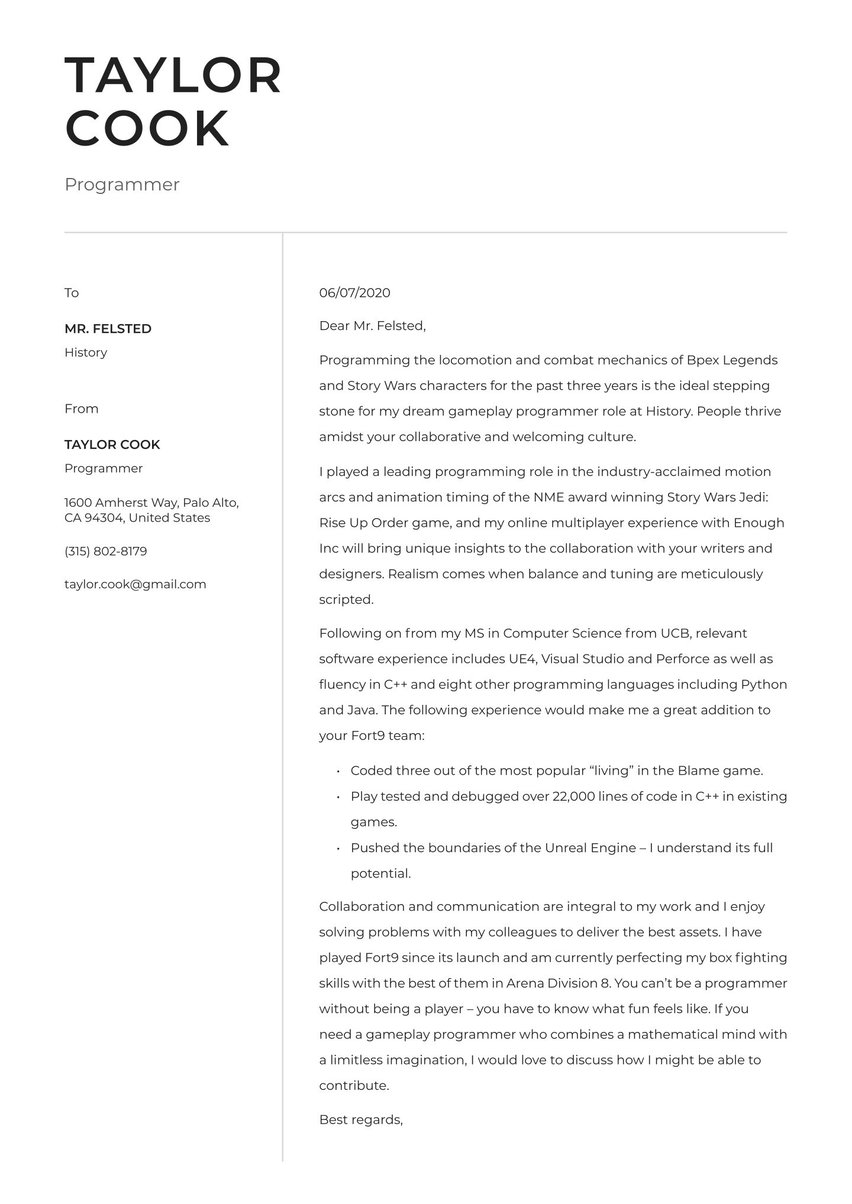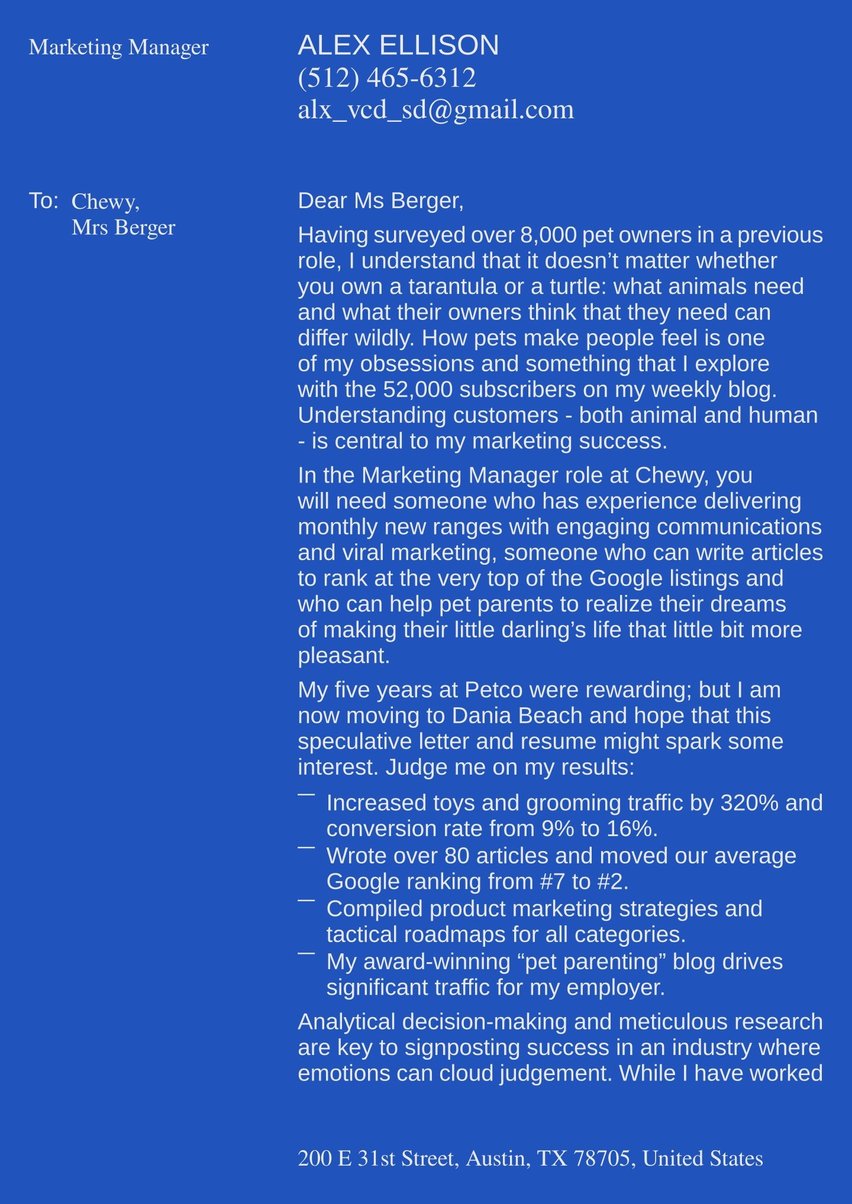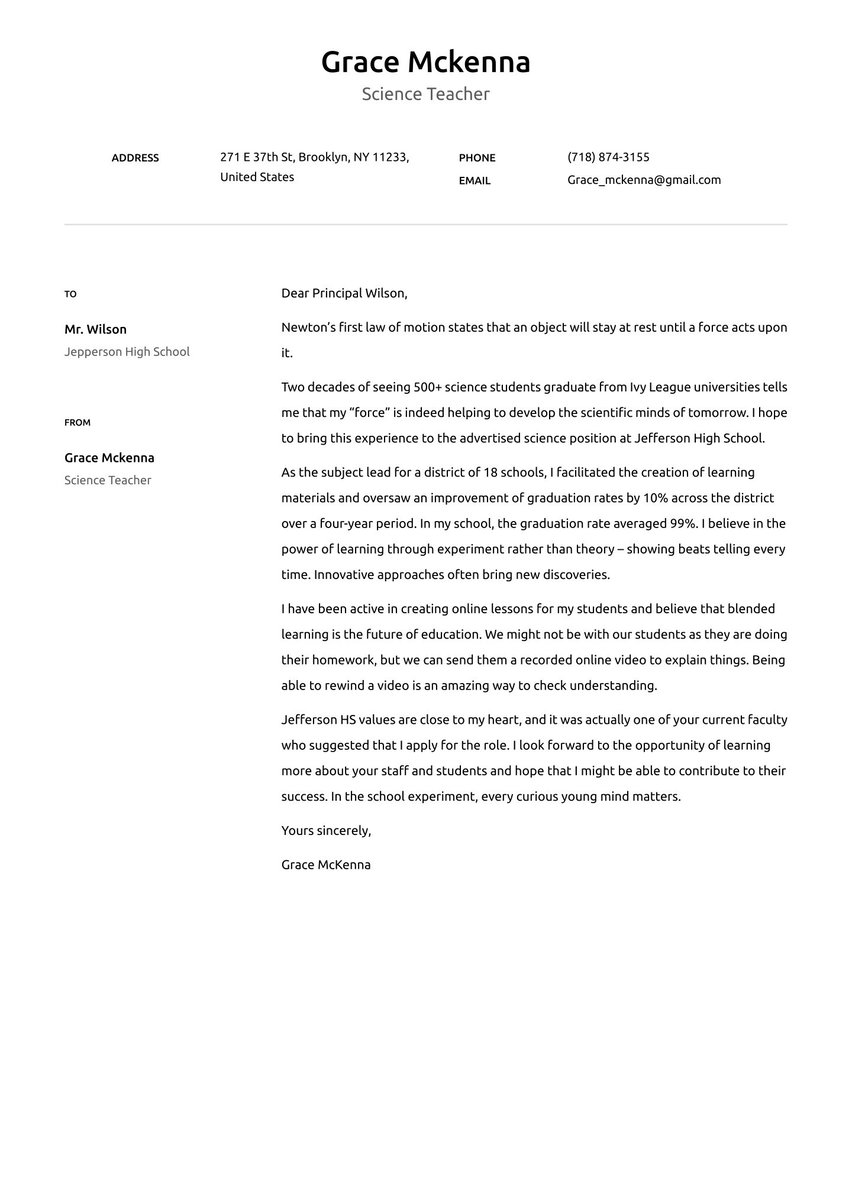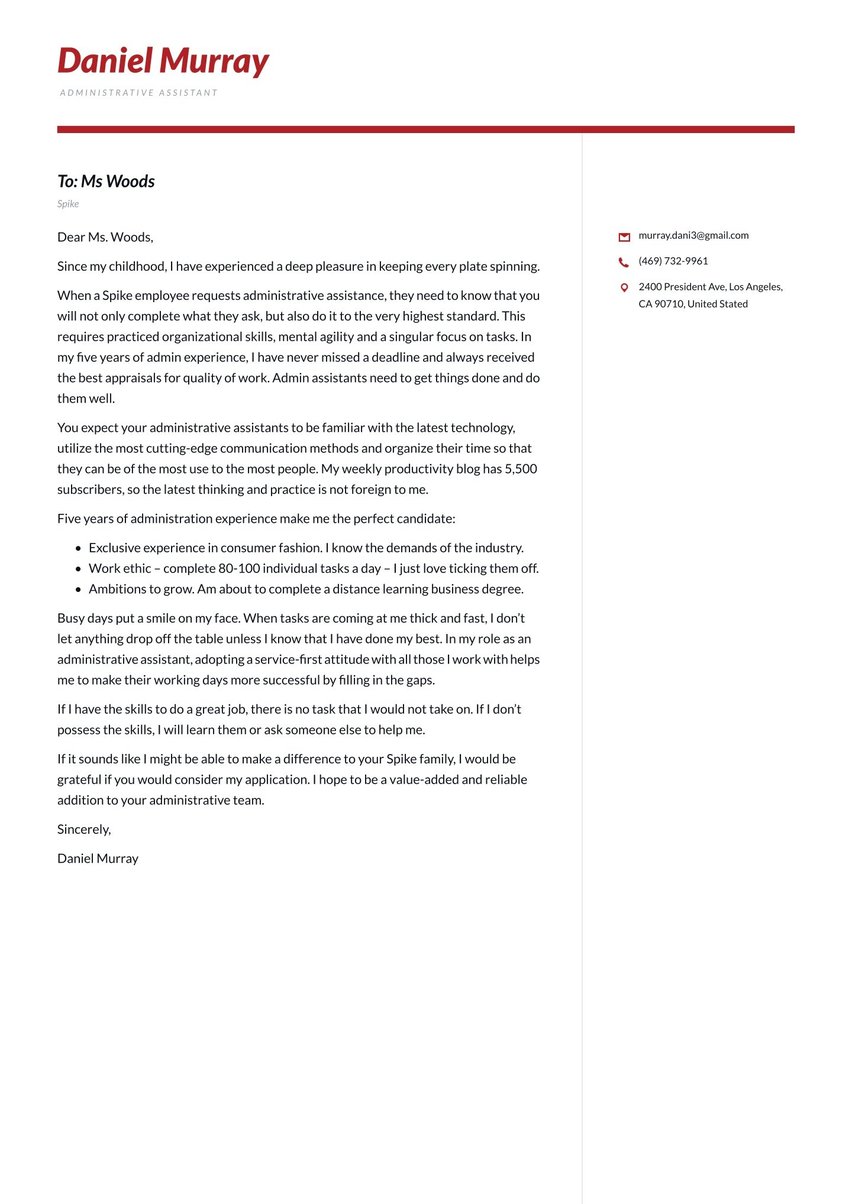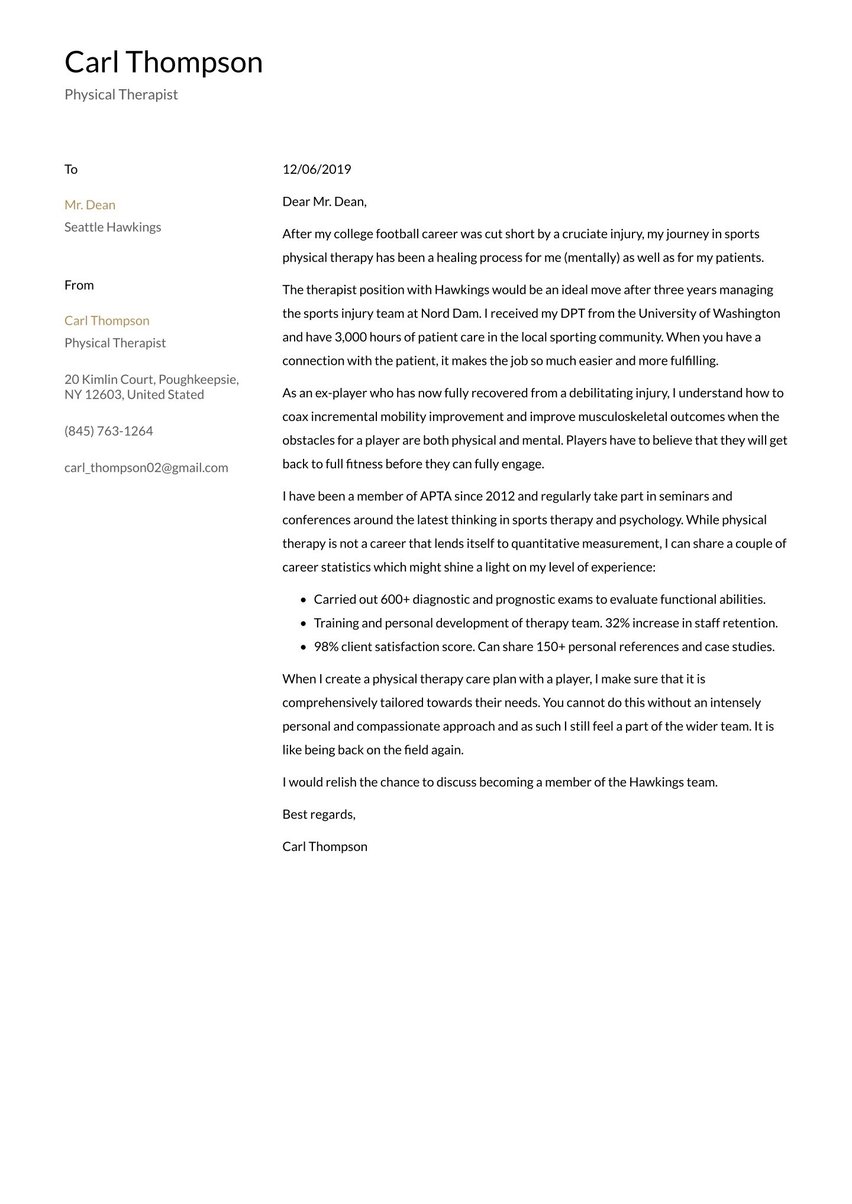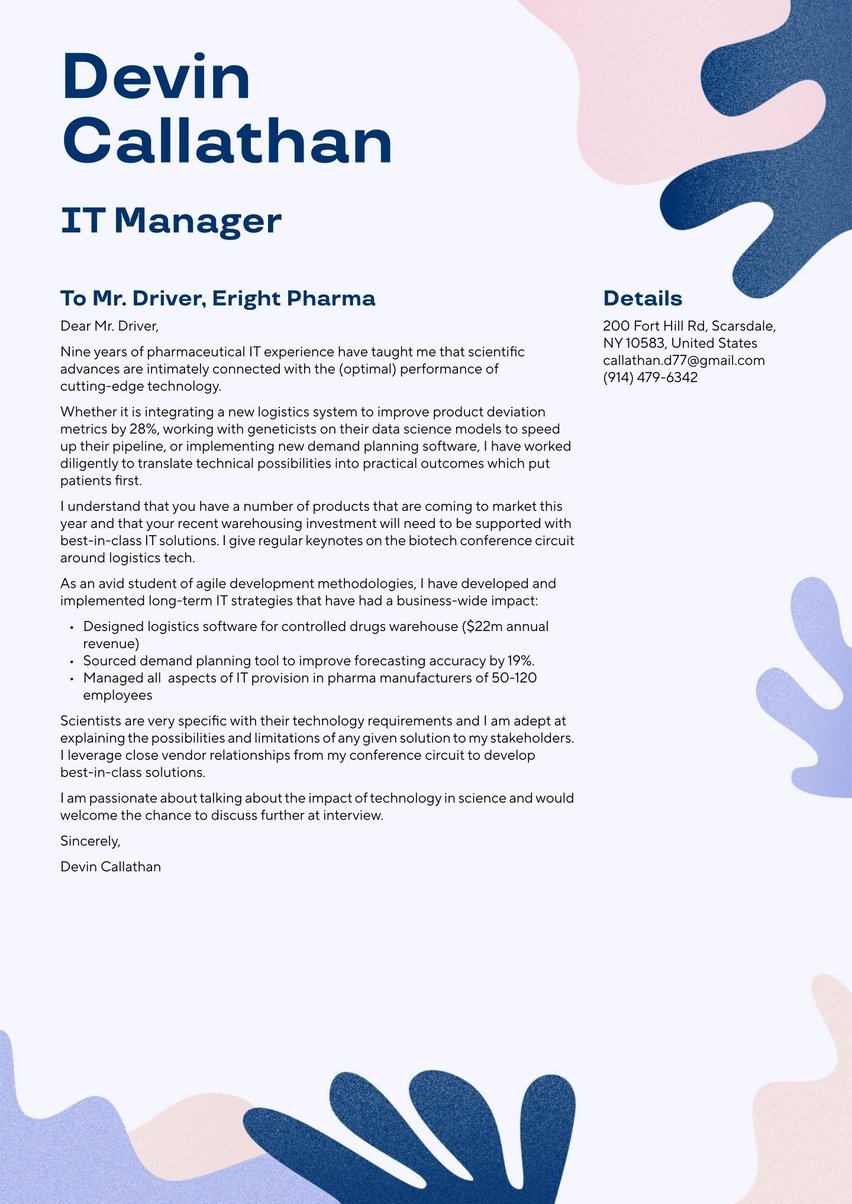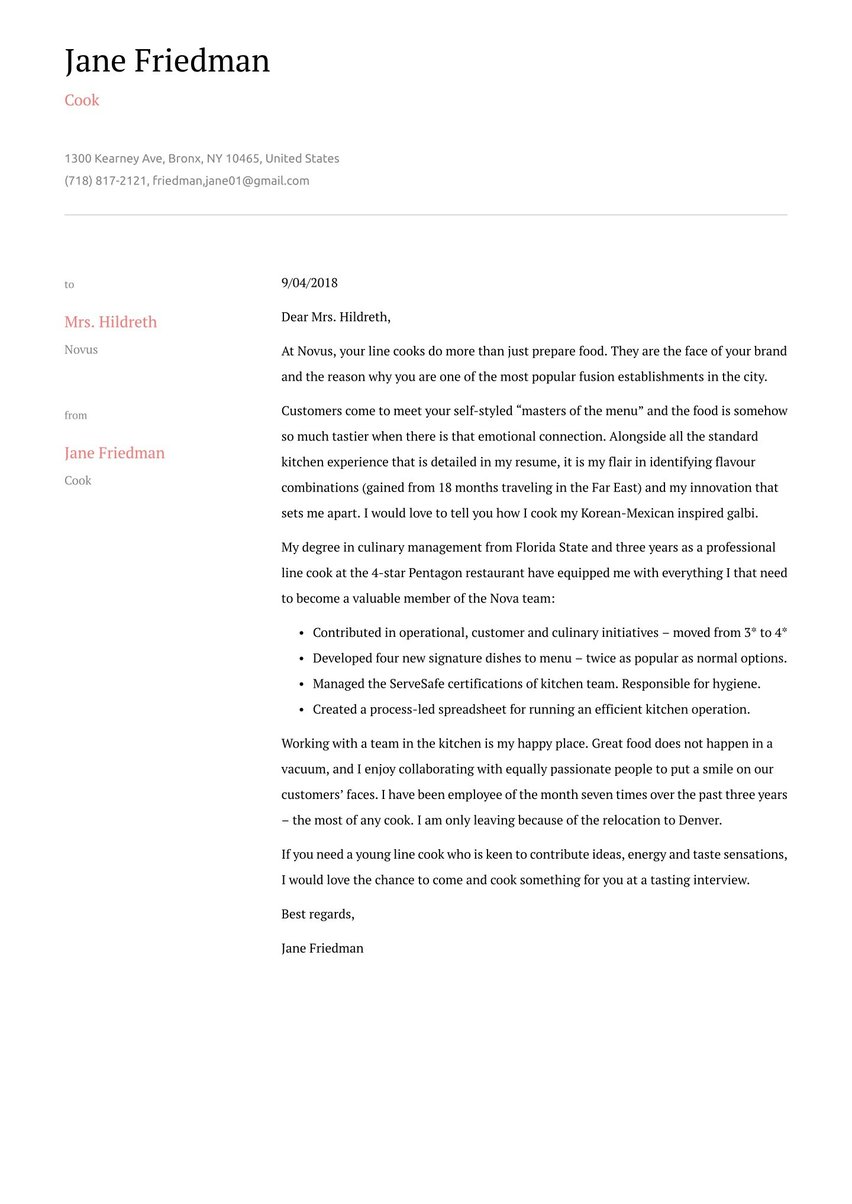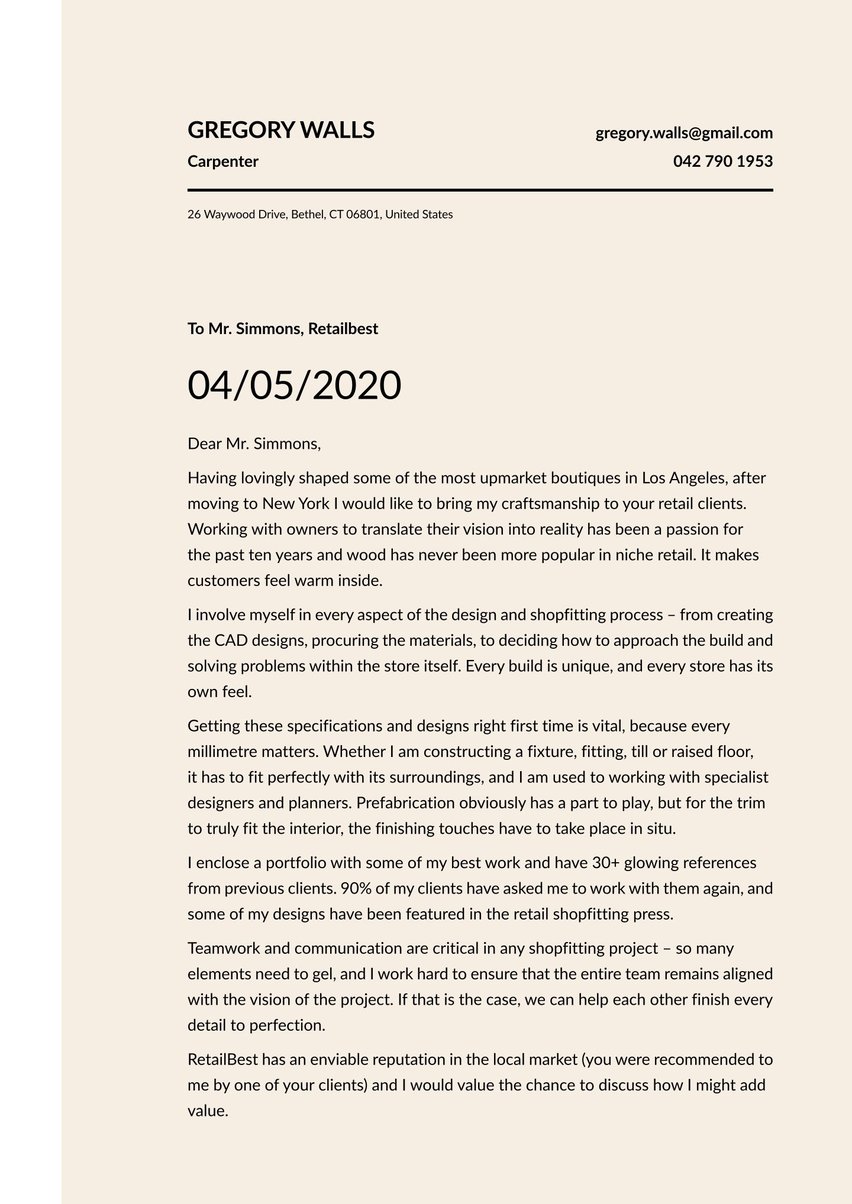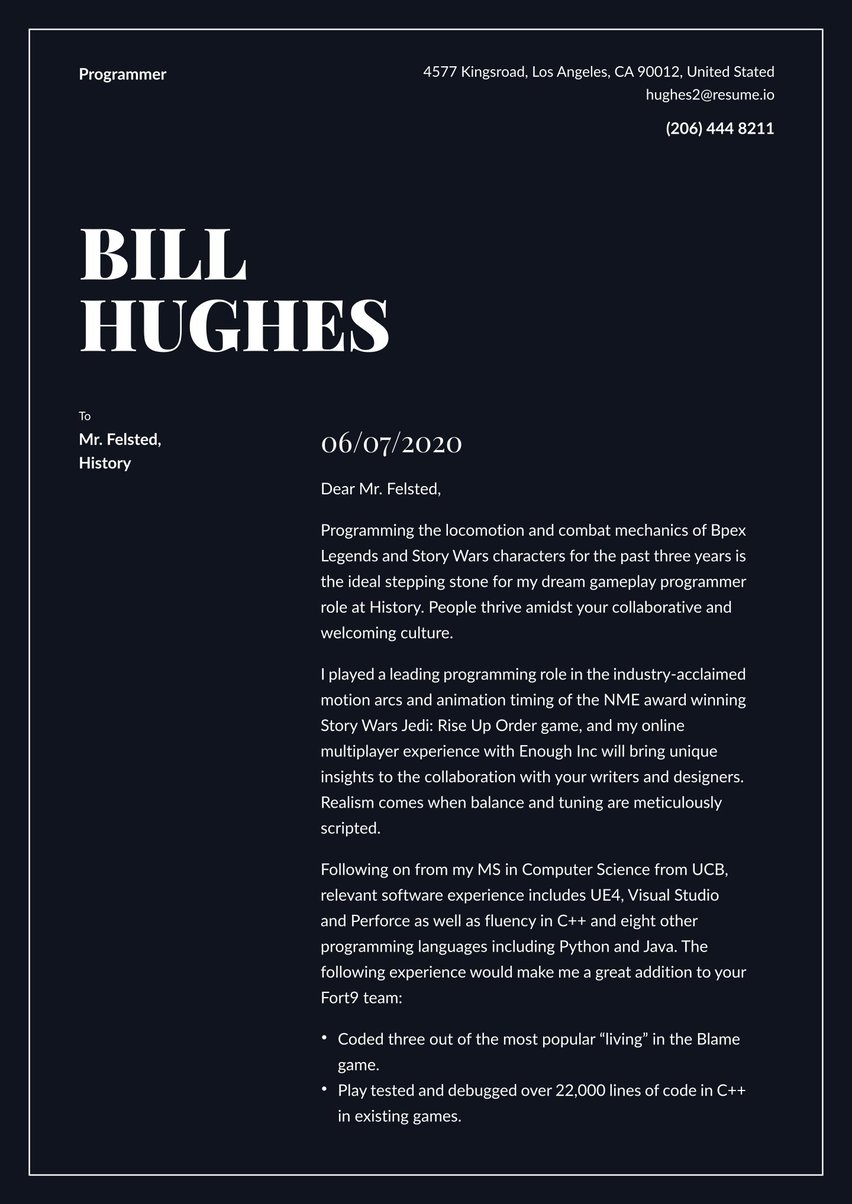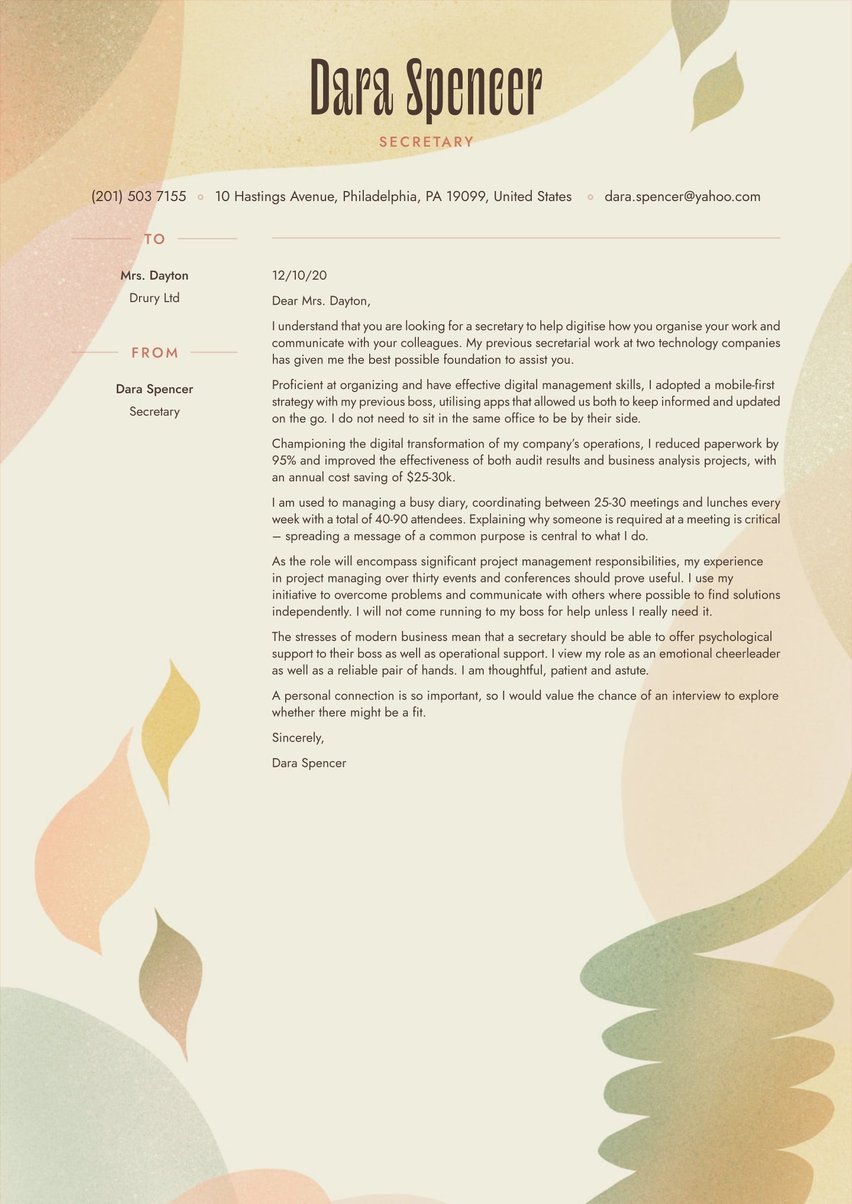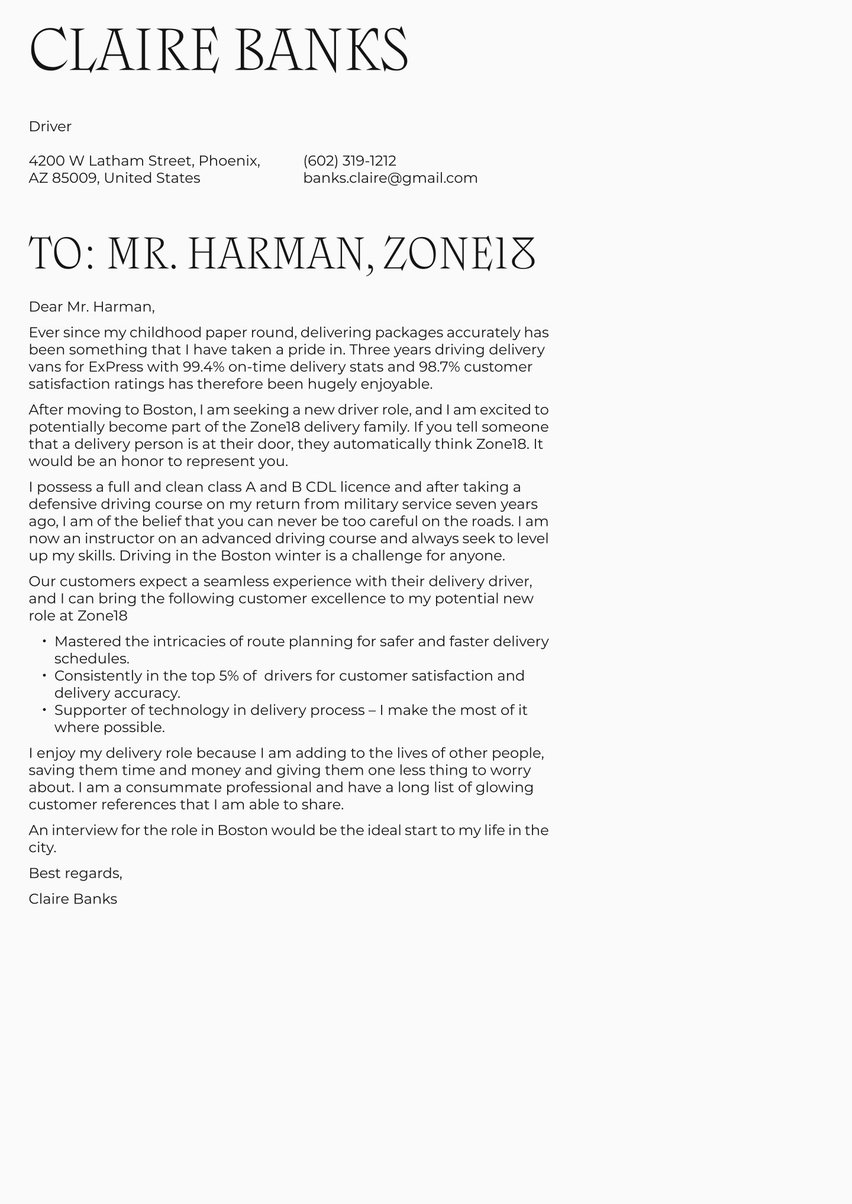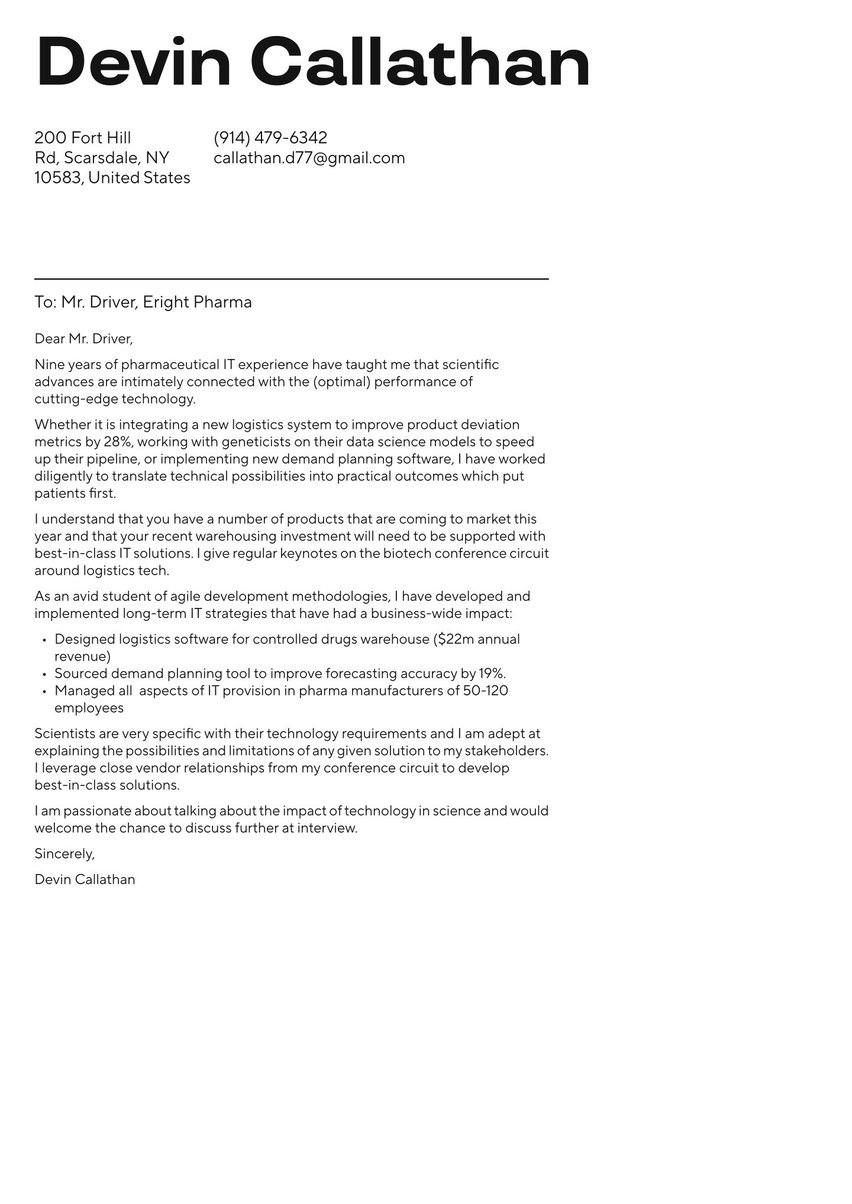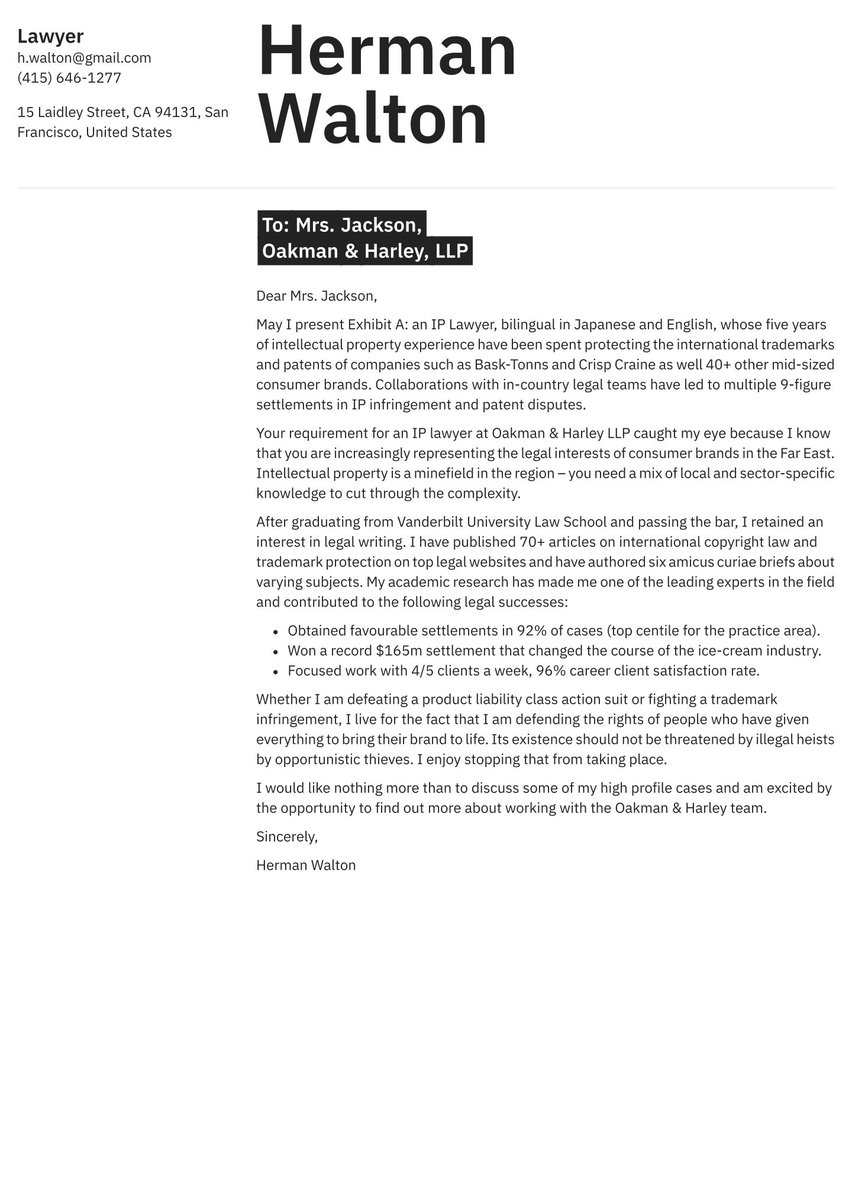A bartender walks into a job interview. Asked how much he’d like to make, he says, “I’ll make as many as they order.” But how did he get this interview in the first place? It probably started with a great bartender cover letter on top of an impressive resume.
Bartender cover letter examples by experience level
As well as being characters in a thousand bad jokes (and good movies), bartenders are beloved figures in our society. They are good listeners and good talkers, and as Billy Joel might say nowadays, they’re “quick with a joke about why you can’t smoke.” Best of all, bartenders serve us delicious drinks, and what’s not to like about that?
According to the Bureau of Labor Statistics, bartenders in the United States earned a median wage of $12 an hour in 2020, or $24,960 a year. Their earnings come from a combination of wages and tips, and sometimes the tips exceed the wages. Bartender jobs are expected to grow an astonishing 32% from 2020 to 2030, far more than the 8% growth projected for all occupations. No formal education is required, though graduates of bartending courses will have an advantage in the job market.
So let’s say you know how to make a sublime Painkiller, an elegant martini or a refreshing Mai Tai. Plus you’ve got great social skills, and you can knot a bowtie with your eyes closed. What else do you need to get a good barkeep job at the local saloon?
An outstanding bartender cover letter is a great starting place.
Sure, you might be such a regular at the corner bar that the staff knows you better than their spouses. Maybe they figure you’re there so much they might as well put you on the payroll. But all bartender jobs are not created equal. And if you want the higher pay offered by a top-notch restaurant, glitzy casino or upscale watering hole, you should get busy preparing your cover letter now.
Here’s what we’ll discuss in this article:
- How your cover letter should be structured and what each component should contain
- How your cover letter should be designed and formatted
- The psychology of writing a persuasive cover letter
- Common mistakes to avoid
You can find more writing tips and formatting advice in our 125+ cover letter examples and writing guides for all careers and experience levels.
Structure and examples of a bartender cover letter
You can’t make a Tom Collins with whiskey, and you shouldn’t try to reinvent the basic ingredients of a cover letter either. A cover letter is a one-page document, a maximum of 400 words, and here’s the proper structure:
Dear Mr. Deighton,
A bartender position at the Mench would be an ideal move after three years at Charlie’s Sports Bar. I am a huge sports fan and love getting involved in the banter as well as the bartending.
I have considerable experience in all key responsibilities, from serving a wide range of cocktails, beers, wines and mixed drinks to dealing with the pressures of a high-volume environment and being adept at managing bar orders. There was a relatively high turnover of seasonal staff at Charlie’s, as we had a large outdoor area, and I was involved in training and mentoring new members of the team.
I revised procedures for food safety and trained the wider team on health and safety. In terms of luxury food service qualifications, I hold current state- and county-issued Food Handlers and Liquor Cards as well as TIPSO certification.
I am hard-working, energetic and positive in my interactions with customers and colleagues. It can be a stressful job and I was voted “most likely colleague to have a smile on their face” at the last annual awards. Quarterly customer experience reports consistently mentioned interaction with me as “one of the reasons that I will come back to this bar.”
I would welcome the opportunity to visit your establishment and interview with you and your staff. The working environment is important to me and I have heard many good things about the Mench team.
Sincerely,
Michael Johnson
Let’s talk about each of these components.
Looking for more cover letter examples in the Hospitality & Catering industry? Have a look at these other cover letter samples from the same industry.
- Hospitality cover letter sample
- Barista cover letter sample
- Restaurant cover letter sample
- Waitress cover letter sample
- Chef cover letter sample
- Cleaning job cover letter sample
- Starbucks cover letter sample
- Server cover letter sample
- Hotel Receptionist cover letter sample
- Travel Agent cover letter sample
- Restaurant Manager cover letter sample
- McDonald's cover letter sample
- Pastry Chef cover letter sample
Cover letter header
Also known as a letterhead, the header is the space at the top of your cover letter that contains your personal contact info. It should generally start with your name (often in a larger font size), your occupation (“Bartender”), your address, phone number and email. The main purpose of the header is so that employers know how to contact you if they find your pitch interesting. But it’s also an important design element, adding visual appeal to a letter that will otherwise contain nothing but blocks of black paragraphs.
The header allows you to exercise some creativity in the use of color, layout, typography and white space. Looks are important, and your header should look good at a glance.
The header is also the most challenging part of the letter to design, which is why we recommend using a cover letter template where the design is done for you.
Align document styles
Your resume and cover letter should be a “matching set,” using the same fonts, font sizes and formatting styles. The headers of both, for starters, should be very similar if not identical. It should be immediately obvious that these two documents came from the same applicant.
Making the styles of these two documents match gives you a “visual brand” and shows that you understand the importance of coherent design. If they contain totally different fonts and styles, that would suggest a lack of attention to detail that is not attractive in any job candidate.
Cover letter greeting
Also known as a salutation, the greeting is the line of your letter that starts with the word “Dear” (or perhaps a substitute like “Greetings”). Traditional business letters use a “Mr.” or a “Ms.” and the last name of the hiring manager, though a first name is fine if you happen to know the person you’re writing to.
Always try to address your letter by name to the individual in charge of hiring at the company you’re targeting. People like to read their own names, and this is an important way of personalizing your letter and turning it into a two-way dialogue. You’re also more likely to get an answer if you write to a named individual rather than an entire company.
Dear Mr. Deighton,
Cover letter introduction
After the initial pleasantries, at some point you have to serve the customer a drink. The introduction of your cover letter is where you begin to deliver the goods, with one to three provocatively written sentences that identify the job you’re seeking and offer an intriguing preview of your qualifications. See the sample cover letter introduction below.
A bartender position at the Mench would be an ideal move after three years at Charlie’s Sports Bar. I am a huge sports fan and love getting involved in the banter as well as the bartending.
Cover letter body
You’ve got their attention! Now make the sale. The central two of three paragraphs of your cover letter must deliver the heart of your pitch — your work experience, your job skills, your training, and anything else that demonstrates your proven effectiveness as a bartender.
Job experience is key, so here you need to mention any past employment as a bartender, including where you worked and for how long. But that’s not enough. If possible, you need to cite specific achievements in your past jobs, especially if you can use facts and figures, like how much cash you handled per night, how many customers you served or how many drinks you poured per shift.
Especially effective are anecdotes about how you faced a specific challenge, what action you took and what results you achieved. Below is a sample anecdote for the body of a bartender cover letter.
I have considerable experience in all key responsibilities, from serving a wide range of cocktails, beers, wines and mixed drinks to dealing with the pressures of a high-volume environment and being adept at managing bar orders. There was a relatively high turnover of seasonal staff at Charlie’s, as we had a large outdoor area, and I was involved in training and mentoring new members of the team.
I revised procedures for food safety and trained the wider team on health and safety. In terms of luxury food service qualifications, I hold current state- and county-issued Food Handlers and Liquor Cards as well as TIPSO certification.
I am hard-working, energetic and positive in my interactions with customers and colleagues. It can be a stressful job and I was voted “most likely colleague to have a smile on their face” at the last annual awards. Quarterly customer experience reports consistently mentioned interaction with me as “one of the reasons that I will come back to this bar.”
Cover letter conclusion and call to action
Your conclusion might include some kind of summary of what you’ve already said, plus a thank-you for the recipient’s time. But it should also contain a call to action, looking forward to a productive continuation of this conversation. See the sample below.
I would welcome the opportunity to visit your establishment and interview with you and your staff. The working environment is important to me and I have heard many good things about the Mench team.
Sincerely,
Michael Johnson
Cover letter sign-off
Close with a simple “Sincerely,” “All my best,” “Thanks so much,” or whatever feels appropriate, and type your full name below that. If you like, you can also add your scanned signature, though this is not expected in electronic correspondence.
Formatting your cover letter
You don’t keep a sloppy bar, so you don’t want to write a sloppy cover letter. It should look as good as it reads. Follow these tips to make sure your cover letter is properly designed and formatted:
- Fonts: Avoid exotic, splashy fonts that call attention to themselves rather than to your content. Use a modern, easy-to-read font.
- Font size: Use a font size no larger than 12 points and no smaller than 10. If your letter doesn’t fit onto one page, trim your text before you try reducing the font size.
- Text alignment: Text should be aligned left, not justified from margin to margin. Text that’s aligned left (like what you’re reading now) leaves a little space at the end of each line, giving the eye a break and making the text easier to navigate.
- Paragraphs: Add a space between paragraphs, don’t indent them, and keep them short enough to avoid big blocks of unbroken text.
- Margins: Use a one-inch margin on both sides of your letter, as well as the top and bottom.
- Save as PDF: Save your letter as a PDF, which will preserve your formatting so that it looks the same on the recipient’s computer as it does on yours. In rare cases, employers prefer some other file type, like a Word document, but go with a PDF unless instructed otherwise.
- Use a cover letter template: The simplest way to avoid any of these errors is to use a professionally designed template like those we offer at Resume.io. We’ve done the formatting for you — all you have to do is write the letter.
The psychology of writing a persuasive cover letter
Psychologists say most of our decisions are made at a deep subconscious level, before our logical brains kick in to agree with what our “gut” has already told us. Another way of saying this is that we are influenced as much by our hearts as by our heads. And when you’re writing a cover letter, you need to aim for both.
Never forget that you’re writing to a human being, and even though this is a business letter, it should also be a personal letter. Don’t overlook the impact of emotional language — talking about your “passions,” what you “love” to do, what “drives” you.
You may have read that you need to optimize your job application for electronic applicant tracking systems (ATS), and this is true. But even though you need to include the right keywords to pass the tests of computer crawlers, this doesn’t mean you should write like a robot.
Put yourself in the shoes of the person you’re writing to. Is your letter imbued with the confidence of competence? Or is it marred by arrogance, or even by excessive humility? Are you speaking in a tone of voice appropriate to your position relative to your correspondent? If you were the hiring manager and you received this letter, would you want to meet the person who wrote it? What’s more, would you want to work with that person, perhaps for years to come?
Study the company you’re targeting, whether it’s a humble roadhouse or a high-end restaurant chain. What kind of language does it use on its website and in its publicity? Identify the style it uses — whether casual, formal, folksy or ultra-sophisticated — and use similar language to make your pitch.
Cover letter mistakes to avoid
If you’ve ever confused sugar with salt in preparing a drink, and seen the shock on your customer’s face upon tasting it, you probably won’t make that mistake again. Here are some common mistakes to avoid in writing a cover letter.
- Typos and other writing errors: You’ve got ONE PAGE to write. If it contains typos, misspellings or bad grammar, that alone could sink your ship. Choose a cover letter builder with a powerful spell-check function. The human eye can miss a typo, but a software algorithm won’t.
- Clichés, HR-speak and fluff: Please do not say you’re a “team player” who “thinks outside the box.” Avoid hackneyed phrases and “fluff.” Language that has been read by the recruiter, hiring manager or employer a thousand times before will damage your chances. Write sincerely, respectfully and factually.
- One letter fits all: If you plan to send the same letter to 50 employers, don’t even bother. Every cover letter should be unique, and should specifically address the needs of the company you’re writing to.
- Irrelevant info: If you’re an ultra-marathoner, we salute your dedication, but you should dedicate the space in your cover letter to information that explains what makes you a good bartender.
- FUBAR formatting: Weird fonts, tiny text, zero margins and unrecognizable file types can all be instant disqualifiers.
Key takeaways
- Bartending is a growing occupation that’s open to all, but an excellent cover letter will improve anyone’s chances at landing the best job.
- Like a well-mixed drink, a cover letter should follow a proven formula and contain the right ingredients.
- Looks matter, and your cover letter should be professionally designed and properly formatted.
- The psychology of writing a persuasive cover letter means getting inside the head (and heart) of your reader.
- Avoid mistakes by using a professional cover letter template like those we offer at resume.io. Find a format you like, fill in your own information, and you’re done!
Now go get that dream bartender job!





